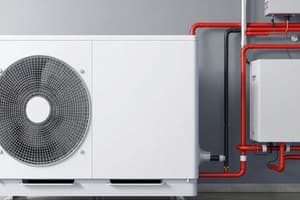Podcast
Questions and Answers
What is the first stage of the refrigeration cycle?
What is the first stage of the refrigeration cycle?
- Condensation
- Expansion
- Compression
- Evaporation (correct)
Which component is responsible for compressing the refrigerant into a high-pressure gas?
Which component is responsible for compressing the refrigerant into a high-pressure gas?
- Compressor (correct)
- Condenser
- Evaporator
- Expansion Valve
What function does the condenser serve in a refrigeration cycle?
What function does the condenser serve in a refrigeration cycle?
- Absorbs heat from the environment
- Regulates the flow of refrigerant
- Pumps the refrigerant
- Transfers heat from the refrigerant to the surroundings (correct)
Which of the following is NOT a common refrigerant?
Which of the following is NOT a common refrigerant?
How can cooling inefficiency in refrigeration systems typically manifest?
How can cooling inefficiency in refrigeration systems typically manifest?
What is the role of the expansion valve in the refrigeration cycle?
What is the role of the expansion valve in the refrigeration cycle?
In which type of system is a compressor typically used for cooling?
In which type of system is a compressor typically used for cooling?
What indicates a need for professional service in refrigeration and air conditioning systems?
What indicates a need for professional service in refrigeration and air conditioning systems?
Flashcards are hidden until you start studying
Study Notes
Principles of Refrigeration and Air Conditioning
-
Basic Concept: Both refrigeration and air conditioning involve the transfer of heat from one area to another using a refrigeration cycle.
-
Refrigeration Cycle:
- Evaporation: Refrigerant absorbs heat from the environment, turning from liquid to gas.
- Compression: The gaseous refrigerant is compressed, raising its pressure and temperature.
- Condensation: The hot gas releases heat to the surroundings and condenses back to a liquid.
- Expansion: The high-pressure liquid refrigerant expands, lowering its pressure and temperature.
Components of Refrigerators and Air Conditioners
-
Compressor:
- Pumps the refrigerant and compresses it into a high-pressure gas.
-
Condenser:
- Transfers heat from the refrigerant to the environment, turning the refrigerant back into a liquid.
-
Expansion Valve:
- Regulates the flow of refrigerant into the evaporator. Reduces pressure and temperature of the refrigerant.
-
Evaporator:
- Absorbs heat from the environment, allowing the refrigerant to evaporate and provide cooling.
Types of Refrigeration/AC Systems
-
Refrigerators:
- Used primarily for food preservation.
- Usually have a more stable temperature than freezers.
-
Air Conditioners:
- Used for cooling and dehumidifying air in living spaces.
- Types include window, split, and central air conditioning systems.
Efficiency and Environmental Impact
-
Energy Efficiency:
- Measured by the Energy Efficiency Ratio (EER) and Seasonal Energy Efficiency Ratio (SEER).
- Higher ratings indicate better efficiency.
-
Refrigerants:
- Common refrigerants include R-134a, R-410A, and natural refrigerants like ammonia and CO2.
- Phase-out of ozone-depleting substances (e.g., CFCs) to reduce environmental impact.
Maintenance Tips
-
Regular Cleaning:
- Clean filters, condenser coils, and evaporator coils to maintain efficiency.
-
Check Seals:
- Inspect door seals for air leaks in refrigerators and AC units.
-
Professional Service:
- Schedule routine maintenance checks to ensure proper operation and efficiency.
Common Issues
-
Cooling Inefficiency:
- Could be caused by blocked vents, dirty coils, or low refrigerant levels.
-
Noise Problems:
- Unusual noises may indicate issues with the compressor or fans.
-
Frost Build-Up:
- Can result from low refrigerant, dirty evaporator coils, or failed defrost heaters.
By understanding these key aspects, you can effectively grasp the principles and functionalities of refrigerators and air conditioning systems.
Refrigeration and Air Conditioning Fundamentals
- Refrigeration and air conditioning work by transferring heat using a closed loop system called the refrigeration cycle.
- The refrigeration cycle involves four key processes:
- Evaporation: The refrigerant absorbs heat from the environment and turns from a liquid to a gas.
- Compression: The gaseous refrigerant is compressed, raising its pressure and temperature.
- Condensation: The hot refrigerant gas releases heat to the surroundings and condenses back into a liquid.
- Expansion: The high-pressure liquid refrigerant expands, lowering its pressure and temperature.
Refrigerator and Air Conditioner Components
- Compressor: The heart of the system, pumping and compressing the refrigerant into a high-pressure gas.
- Condenser: Cools the refrigerant, releasing heat to the environment and turning it back into a liquid.
- Expansion Valve: Controls the flow of liquid refrigerant into the evaporator, reducing its pressure and temperature.
- Evaporator: Absorbs heat from the environment, enabling the refrigerant to evaporate and provide cooling.
Types of Refrigeration/AC Systems
- Refrigerators are mainly used for food preservation and generally maintain a stable temperature, often cooler than freezers.
- Air Conditioners are used to cool and dehumidify air in living spaces, and come in various types such as window, split, and central systems.
Efficiency and Environmental Impact
- Energy Efficiency: Measured by the Energy Efficiency Ratio (EER) and Seasonal Energy Efficiency Ratio (SEER), with higher ratings indicating better efficiency.
- Refrigerants: Common refrigerants include R-134a, R-410A, and natural refrigerants like ammonia and CO2.
- Environmental Impact: Ozone-depleting substances (e.g., CFCs) have been phased out to reduce environmental impact.
Maintenance and Common Issues
- Regular Cleaning: Maintaining efficiency requires cleaning filters, condenser coils, and evaporator coils.
- Check Seals: Inspect door seals in refrigerators and AC units for air leaks.
- Professional Service: Schedule routine maintenance checks to ensure proper operation and optimal efficiency.
- Cooling Inefficiency: May be caused by blocked vents, dirty coils, or low refrigerant levels.
- Noise Problems: Unusual noises can indicate issues with the compressor or fans.
- Frost Build-Up: Can occur due to low refrigerant, dirty evaporator coils, or failed defrost heaters.
Studying That Suits You
Use AI to generate personalized quizzes and flashcards to suit your learning preferences.



